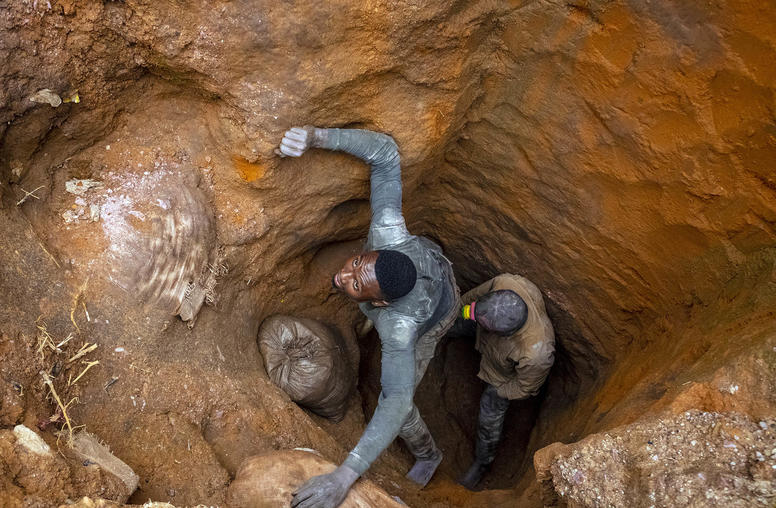China in Conflict Zones: Cooperation or Competition?
Conference Examines How Chinese Policy and Actions Square With U.S. Aims
China’s spreading global presence in efforts to quell war and instability beyond its borders impacts peace and conflict dynamics across the world. Beijing’s leaders have hosted peace talks between the Afghan government and the Taliban, participated in international meetings on the Syrian civil war and increasingly deploy Chinese peacekeepers to African conflicts. The U.S. Institute of Peace and Georgetown University’s Center for Security Studies hosted a daylong conference on March 22 examining China’s impact—positive or negative—on local and international efforts to reduce violent conflict.
China has called for greater counterterrorism cooperation in Africa, the Middle East and South Asia. Its companies are investing in numerous “Belt and Road” infrastructure projects that may boost development and stability in fragile states, or conversely, may benefit the corporations without bringing tangible benefits for local populations. The approach by Beijing also can significantly advance or detract from U.S. interests and global peacebuilding norms.
Scholars and policy experts examined China’s role in a range of conflicts, looking at the local and regional implications of actions in Afghanistan and Pakistan and in the countries of the Middle East and Africa. One panel discussed the major strategic challenges to the United States posed by North Korea and Russia, and how China’s role may affect or complicate U.S. policies towards these countries. The panelists also evaluated the policy implications for the Trump administration. Follow the conversation on Twitter with #ChinaGUUSIP.
Updated Agenda
8:30am-9:00am: Registration and Breakfast
9:00am-9:15am: Welcome
- Ambassador William B. Taylor
Executive Vice President, U.S. Institute of Peace - Thomas Banchoff
Vice President for Global Engagement, Georgetown University
9:15am-10:30am: Panel One - China’s Peacebuilding Role in Afghanistan and Pakistan
This panel will examine Beijing’s growing engagement on both counterinsurgency and counterterrorism issues in Afghanistan and Pakistan, including China’s active participation in the Quadrilateral Coordination Group that aimed to facilitate peace talks between the Afghan government and the Taliban.
- I-wei Jennifer Chang
Program Specialist, China Program, U.S. Institute of Peace, Moderator - Andrew Small
Senior Transatlantic Fellow, Asia Program, German Marshall Fund of the United States - Lan Jiang
Professor and Deputy Director, Center of Pakistan Studies, China West Normal University - Ahmad Khalid Majidyar
Fellow and Director, IranObserved Project, Middle East Institute - Lisa Curtis
Senior Research Fellow on South Asia, Asian Studies Center, Heritage Foundation
10:30am-10:45am: Break
10:45am-12:00: Panel Two - China’s Approach to Conflict and Terrorism in Africa\
This panel will assess China’s peacebuilding role in ongoing conflicts in Africa, including Nigeria and South Sudan. Panelists will assess China’s economic investments, developmental assistance, and security contributions to the region.
- Ambassador Princeton Lyman
Senior Advisor for Middle East and Africa, U.S. Institute of Peace, Moderator - Yun Sun
Senior Associate, East Asia Program, Stimson Center - Joshua Eisenman
Assistant Professor of Public Affairs, University of Texas at Austin, Senior Fellow for China Studies, American Foreign Policy Council - Raymond Gilpin
Dean, Africa Center for Strategic Studies, National Defense University
12:00pm-1:00pm: Lunch Keynote Address by Dennis Wilder on “Building U.S.-China Strategic Trust”
Dennis Wilder is former Special Assistant to the President and Senior Director for East Asian Affairs at the National Security Council under President George W. Bush (2005-2009). He is a Professor of Practice in the Asian Studies Program and Senior Fellow at the Initiative for US-China Dialogue on Global Issues. Professor Wilder has advised various agencies on shaping U.S. policy toward East Asia.
1:00pm-2:15pm: Panel Three – Chinese Diplomacy in Middle East Conflicts
This panel will address China’s diplomacy on peace and stability in the Middle East, including its role in the Iranian nuclear issue and the Syrian civil war.
- Colin Kahl
Associate Professor, Center for Security Studies, Georgetown University, Moderator - Carrie Liu Currier
Associate Professor of Political Science and Director of Asian Studies, Texas Christian University - Sun Degang
Professor and Deputy Director, Middle East Studies Institute, Shanghai International Studies University - Randa Slim
Director, Initiative for Track II Dialogues, Middle East Institute
2:15pm-2:30pm: Break
2:30pm-3:45pm: Panel Four – China and Global Strategic Challenges: North Korea and Russia
This panel will discuss China’s current relationships with North Korea and Russia and potential U.S.-China cooperation to coordinate policies and approaches towards these two countries.
- Jennifer Staats
Director, China Programs, U.S. Institute of Peace, Moderator - Victor Cha
Senior Advisor and Korea Chair, Center for Strategic and International Studies; Director of Asian Studies and D.S. Song Chair, Department of Government and School of Foreign Service, Georgetown University - Richard Weitz
Senior Fellow and Director, Center for Political-Military Studies, Hudson Institute - Ren Xiao
Professor, Institute of International Studies, Fudan University - Andrew Kuchins
Senior Fellow, Center for Eurasian, Russian and East European Studies, School of Foreign Service, Georgetown University - 3:45pm-4:15pm: Concluding Remarks: Policy Recommendations for the U.S.
- Jennifer Staats
Director, China Program, U.S. Institute of Peace - David S. Maxwell
Associate Director, Center for Security Studies, Walsh School of Foreign Service, Georgetown University



